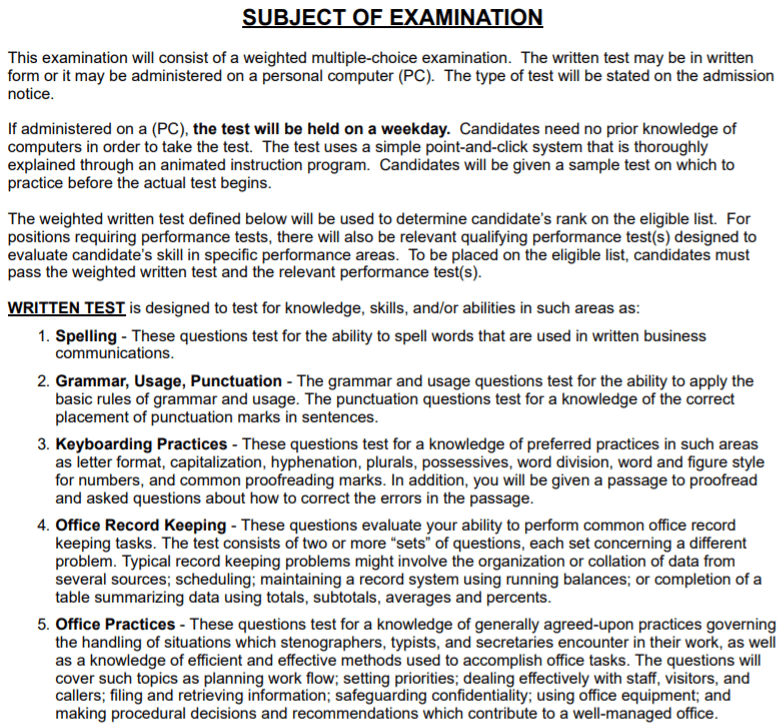Preparing for a civil service exam can feel overwhelming, but with the right approach and tools, you can face the test confidently and effectively. Civil service jobs range from roles in federal agencies to positions in state and local government, each offering a stable, long-term career with great benefits. To begin this journey, passing the civil service exam is often the first step. Here’s how you can prepare effectively and efficiently.
Understanding Civil Service Exams
Civil service exams are not one-size-fits-all; they vary depending on the specific job you’re applying for. Unlike exams with a national standard, each hiring agency – whether federal, state, or local – sets its own exam requirements. Generally, however, you can expect these exams to assess core skills: verbal, clerical, and mathematical abilities.

Step 1: Know What to Expect on Your Exam
Every civil service exam is unique. Begin your preparation by thoroughly reading the job announcement to identify the specific topics covered in your test. Typically, announcements include a breakdown of the exam’s content, which can guide your study approach. If the topics aren’t listed, it’s safe to focus on the basics that most civil service exams cover: verbal reasoning, math, and clerical skills. These foundational areas are a great starting point.
Common Test Sections Explained
Most civil service exams assess general skills applicable to a wide range of positions. The most common sections include:
- Reading Comprehension: Tests your ability to understand, interpret, and analyze written passages.
- Numerical Reasoning: Assesses your ability to work with numbers, including basic math, data interpretation, and sometimes more complex calculations.
- Clerical Abilities: Covers skills like attention to detail, data checking, and organizational tasks.
For example, the written test for many clerical and administrative roles includes sections on spelling, grammar and punctuation, keyboarding practices, office record-keeping, and office practices. Each of these areas is designed to evaluate specific skills essential for maintaining a well-managed office and handling day-to-day administrative tasks.
Step 2: Use the Prep Manual Provided
Many agencies provide a prep manual or test guide to applicants. This manual often includes a content outline, test-taking tips, and practice questions. It’s a primary resource that should anchor your study plan. By reviewing the topics in the manual, you can familiarize yourself with the exam’s structure, helping you feel more confident and reducing surprises on test day.
Step 3: Take Practice Tests Regularly
Practice tests are essential for several reasons. They help you:
- Identify Weak Areas: By seeing which questions challenge you most, you can focus your study on areas that need improvement.
- Build Speed and Stamina: Civil service exams are timed, so developing time-management skills is crucial. Practicing under timed conditions will make you more comfortable with the pace of the actual test.
- Increase Comfort with the Format: Taking practice tests that mimic the exam format will build familiarity, reducing stress on the actual test day.
Use online resources or any practice tests provided in your prep manual. Repeat this process often – consistency is key.
Exam Format and Timing
Understanding the format of your exam and the time allocated for each section can significantly impact your performance. Each section may have strict time limits, so practice managing your time carefully within each section’s constraints. For example, if the reading comprehension section allows 25 minutes, practice answering questions within this time frame to improve your pace and confidence.
Step 4: Create a Personalized Study Guide
With a clearer understanding of your strengths and weaknesses, build a study guide tailored to your needs. List the topics you need to study, then set a schedule that balances these topics over time. Focus your attention on areas that need improvement, but don’t neglect your strengths entirely.
Step 5: Study General Skills Relevant to Civil Service
Most civil service jobs require you to demonstrate practical, everyday skills like problem-solving and teamwork. Integrate these into your study routine by:
- Practicing problem-solving with real-world scenarios related to your prospective job.
- Engaging in teamwork activities if possible, even outside your study time, as this helps develop your interpersonal and collaborative skills.
Step 6: Simulate Test Day Conditions
As test day approaches, simulate the exam environment to get a feel for the experience. Set a timer, clear your desk, and eliminate all distractions. Practicing in a “real” test environment helps reduce anxiety and improve concentration, as your brain becomes accustomed to the pressures and time constraints of the actual exam.
Step 7: Consider Extra Support through Workshops or Online Courses
If you feel that self-study alone isn’t enough, consider attending a workshop or enrolling in an online course. These resources often provide additional practice materials, expert advice, and structured guidance that can help you navigate specific challenges of the civil service exam.
Step 8: Take Care of Yourself
The day before the exam, take it easy. Prioritize sleep, a balanced diet, and light exercise to ensure you’re well-rested and alert. Preparing physically and mentally for the test day can significantly impact your focus and energy levels.
Final Thoughts
Studying for the civil service exam requires focus, strategy, and persistence. By following these steps and keeping a consistent study schedule, you’ll be well-prepared to tackle the exam. Remember, a successful career in civil service is within your reach – approach the test with confidence, and use each study session as a building block towards your goal.
Good luck, and remember: preparation is your key to success!
If you’re looking for additional guidance, iPREP offers a comprehensive Civil Service test prep course designed to help you succeed on your exam.






What’s the name of your Mobile App for iphone?
Our website itself is the web-app. This means it was specifically designed to be used on your mobile as-is with no need to download anything.